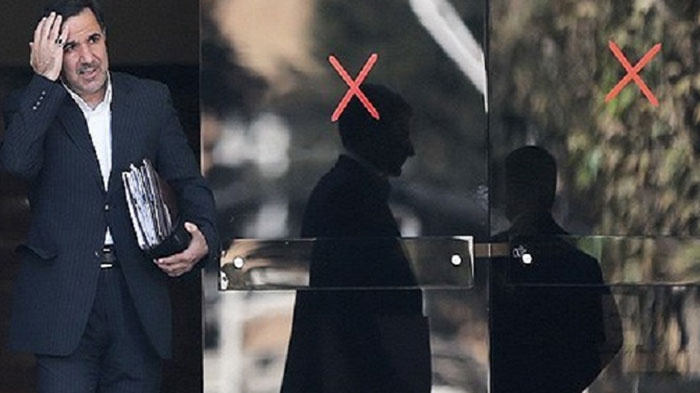Principlists Double Down on Minister of Transportation After Deadly Train Crash

(Picture: Abbas Akhoundi leaving a cabinet meeting.)
On Friday, two trains clashed near Semnan, about 200 km east of Tehran. According to local officials, 45 passengers have been killed in the accident. Despite continued investigations, sweeping social media was the early account of Iran’s Railway CEO Mohsen Pourseyed Aghaei that put the blame on the lack of coordination between switchmen in the process of a shift change. Many since have shed doubt that the reduction of the incident to a human error is being used to evade responsibility.
Then came Minister of Roads and Urban Development Abbas Akhoundi’s best shot at condoling the nation, as he said all those killed in the crash were under insurance coverage and thus, there is no need to worry. This sparked a tornado of bitterly sarcastic memes, jokes, and caricatures as well as a heated political debate favoring Akhoundi’s resignation.
The incident, and consequent off-the-cuff remarks by officials, gave the Principlists, long in a frontal assault, a free hand to push forward their partisan agenda. From the very day of his appointment, Abbas Akhoundi has been among the easiest targets in the Rouhani administration for its opponent conservatives.
A recurrent theme in critiques of Akhoundi was his handling of Maskan-e Mehr, a major cheap housing plan launched under Ahmadinejad, stretched into Rouhani’s administration. Criticizing belated finalization and increased costs culminated in an impeachment motion for Akhoundi who came out clean with the majority of lawmakers voting against it. The outsourcing of railway’s catering services to an Austrian company and the order placed to buy Airbus and Boeing airplanes to renovate Iran’s old fleet are recent examples of pretexts used after the nuclear deal to hammer the 59-year old minister.
A new motion to impeach Akhoundi has now collected fifty signatories in the parliament. Even some reformists and moderates have voiced their criticism of the ministry, among them Vice Speaker Ali Motahari and leading pro-reform lawmaker Mohammadreza Aref.
On Saturday evening, Iran’s Railway CEO Mohsen Pourseyed Aghaei told a news show on state-run TV that he had submitted his resignation in a bid “to respect public opinions and the social responsibilities of executive officials”. While the resignation and Akhoundi’s ensuing approval is hailed by many as an unprecedented apologetic gesture, others see it a forward escape to save the minister. Media outlets and political circles, mostly but not exclusively Principlists in orientation, did not withdraw their calls for Akhoundi to step down.
Pro-reform daily Aftab-e Yazd’ headline urges “Mr. Minister” to resign in an auspicious bid that could harbinger a new trend dearly missed in Iranian style of governance. The cover story written by Hirash Saeedian in Aftab-e Yazd says there will be many bright sides to the resignation, including the strengthening of pro-Rouhani arguments in presidential debates. “It could also eliminate the old excuse that there is no substitute qualified enough [for governmental portfolios], once and for all,” Saeedian argued. He noted that such a resignation will be an indicator of the fact that the lives of citizens outvalues administrative jobs.
On a darker note, Principlist media outlets are trying every trick in the book to force Akhoundi to resign. Nasim Online, for one example, has published more than a handful of articles on the issue, with headlines reading like “Mr. Minister’s forward escape”, “Experts Urge Majlis to Impeach Akhoundi”, and “The French Stand him UP”, pointing to Akhoundi’s seemingly endless negotiations with Europeans to receive Airbus planes. Raja News’ Mostafa Mazaheri puts the blame for the train crash on the Automatic Train Control (ATC) contractor and calls for a probe to investigate the railway company’s contract under the Rouhani administration.
Be it impeachment or forced resignation for Akhoundi, it appears more as a political arm-wrestling aimed to weaken the Rouhani administration. Proof is what Iranian Labor News Agency (ILNA) has put in a nutshell:
“Under the Ahmadinejad administration, more than 30 railway and aircraft incident happened with the death toll of rising to more than 400 and over 250 casualties; no official resigned”.
Or none had to.

